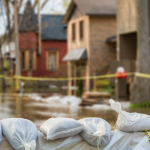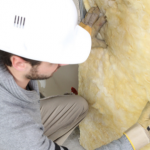How To Prevent Water Damage in Your Home
Water damage can weaken your home’s foundation and cause other major issues to the structure of your home. These issues can range from mold and mildew to weakened joists and framing that invites bugs like termites or carpenter ants. It is a lot less expensive to prevent water damage than it is to pay for the necessary repairs. Here’s how you can protect your home against water damage that will help give you peace of mind.
Monitor Your Gutters and Downspout
Make sure your gutters and downspout are clear of leaves and other debris that can cause clogs. This job can easily be done yourself with the right tools, however, if this is not something you are comfortable with, you can certainly hire a professional. You should also make sure your downspouts are direct 5-10 feet away from your house.
Disconnect Your Hoses
During the months with freezing temperatures, make sure you disconnect your hoses. Standing water in a hose can quickly freeze, expanding back into the pipes. This can create an ice block that can stop water flow or, worse, can cause your pipes to burst.
Check Your Roof
Because your roof is exposed to extreme elements, your roof is vulnerable to damage and could be compromised. Once or twice a year (fall and spring are perfect times to do this), check your roof for any missing shingles or damaged areas.
Grade Your Yard
To ensure water flows away from your house and not into its foundation, make sure your yard is sloping away from your house. You can do this job yourself or hire a professional.
Keep an Eye on Landscaping
A large tree may be beautiful above ground, but you never know what could be happening underground. Plants and trees with invasive root systems can wreak havoc on your water lines, drainage system, and other pipes. Be cautious about what you plant and where you plant it.
Conduct Pipe Checks
You should check your home for leaky pipes often. Catching a leak when it’s new and small is a much easier job to handle than when it’s a big leak that’s already caused plenty of damage. Do not wait to make repairs to these leaks. If ignored, water damage can lead to dry rot, mold and mildew, and even structural damage.
Conduct Appliance Checks
Along with pipe checks, you should examine your appliances regularly. This includes your major appliances like your fridge and freezer (don’t forget secondary fridges/freezers if you have them), dishwasher, pot filler, washer and dryer, water heater, and anything else that has water running to it.
Keep Your Pipes Clear
Make sure your pipes are clear of any clogs. Bathroom sinks and tub/showers are notoriously clogged with hair and other junk. Use a drain snake to unclog this mess. You should also make sure you’re taking care of your kitchen sink. Do not pour grease or fat down your sink as it can cause clogs. Pour unwanted grease and fat into a can, baggie, or aluminum foil and throw it out.
Watch Your Water Bill
If you notice your water bill cost has suddenly spiked for no reason, it could be because of a leak. Be sure to keep an eye your bill as it comes in each month.




